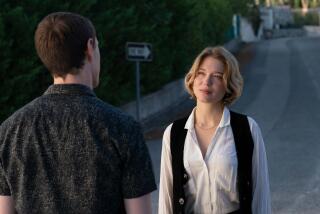Blistering film puts you in a maelstrom
Though he’s directed only four features and is little known in this country, a case could be made for writer-director Jacques Audiard as France’s most compelling, most visceral and exciting filmmaker. A case his latest film, the forceful “The Beat That My Heart Skipped,” does nothing but strengthen.
Like Audiard’s three previous features -- “Read My Lips,” “A Self-Made Hero” and “See How They Fall” -- “The Beat” starts with familiar material and increases the emotional intensity without sacrificing credibility. Not surprising given his legacy (he’s the son of prolific French screenwriter Michel Audiard), the filmmaker has a gift for psychological acuity and empathy with not always pleasant characters. His films start out seeming like genre exercises, but, as co-writer Tonino Benacquista says in the press notes, “Jacques Audiard’s pictures are never genre movies.”
In “The Beat,” Audiard has set himself a greater challenge than usual. He has remade “Fingers,” James Toback’s pretentious 1978 cult item, a film that even Audiard admits contains “a certain amount of cinematic posturing that ages badly.”
What “Fingers” also contains is a useful plot hook: a frenetic young man (Harvey Keitel in the original) who can’t choose between his father’s mobster life and his mother’s world of the concert piano. As Benacquista accurately reports, “We kept Toback’s initial premise but changed everything else.”
What has resulted is a blistering film you feel in the pit of your stomach, a jumpy, edgy piece of work that thrusts us into a personal maelstrom so tortured and intense, the emotions could be spread with a knife. With Romain Duris indelible as protagonist Tom, “The Beat” cuts to the bone emotionally and refuses to flinch.
Enhancing this intensity are a pair of related decisions made by Audiard and his cinematographer Stephane Fontaine. Determined to avoid what he called “over-insistent jump cutting,” Audiard decided that every scene should be done in long, single-shot takes. And making those shots hand-held and almost always from Tom’s point of view ensures that, in Fontaine’s words, “the camera is an organic part of the character. It has to feel the same things that Tom feels, experience the things he experiences.”
Hot-tempered and arrogant, Tom tells people he’s in real estate, but as we follow his day-to-day activities, it’s apparent he’s more of a thug than anything else. More black leather jacket than tie (though he wears them both), Tom is willing to do whatever it takes, from planting rats in an apartment to physically intimidating squatters, to make a profit on Paris buildings he and his partners covet.
In all this Tom is very much his father’s son. Robert (Niels Arestrup, whose yellow jacket is a conscious hommage to the original) is a failing loan shark who no longer has the strength to collect what’s owed him. Tom hates serving as the old man’s muscle, but, with a father who is a virtuoso at inducing guilt, he can never manage to refuse.
Tom’s late mother, it turns out, was another kind of virtuoso, a concert pianist with considerable gifts. One day, completely by chance, Tom catches sight of his mother’s former agent. It’s clear from their conversation that once upon a time Tom was a pianist with promise, so much so that the agent leaves him with an open invitation to audition when he feels ready.
Tom, it turns out, has played hardly at all for the last 10 years. But rather than brush the invite aside, he feels it take hold of him like a powerful drug, the dream of the person he might have been haunting him like a ghost. He hires a young Vietnamese woman (Linh-Dan Pham), so new to Paris she speaks no French, to help tutor him, watches Horowitz videos at night, practices, dreams, and continues to beat people up.
The heart of “The Beat That My Heart Skipped” is the uncomfortable, unavoidable conflict between these two halves of Tom, both powerful, both genuinely him. As his lessons force him deeper into a double life, his unbalanced nature gets more and more high-strung, gradually resembling nothing so much as an exaggerated, violent version of a classic artistic temperament.
Almost imperceptibly, we start to feel that Tom’s passion for the piano also symbolizes a desire to escape his life that he refuses to acknowledge. Gradually, the questions the film asks move from, Will he succeed as a virtuoso? to include, What will the effort to get there do to him? For what makes “The Beat That My Heart Skipped” exceptional is that it turns out to be as much about a human being in terrible crisis as it is about someone with a thwarted dream.
*
‘The Beat That My Heart Skipped’
MPAA rating: Not rated
Times guidelines: Sex and violence and a savage emotional tone
Released by Wellspring. Director Jacques Audiard. Screenplay Jacques Audiard, Tonino Benacquista, based on the film “Fingers.” Cinematographer Stephane Fontaine. Editor Juliette Welfling. Costumes Virginie Montel. Music Alexandre Desplat. Production design Francois Emmanuelli. Running time: 1 hour, 37 minutes.
In limited release.
More to Read
Only good movies
Get the Indie Focus newsletter, Mark Olsen's weekly guide to the world of cinema.
You may occasionally receive promotional content from the Los Angeles Times.










